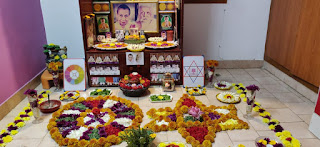Nationalism is simply the passionate aspiration for the realisation of that Divine Unity in the nation, a unity in which all the component individuals, however various and apparently unequal their functions as political, social or economic factors, are yet really and fundamentally one and equal.
Sri Aurobindo
CWSA, V0l, 6-7, Pg-679
The supreme test of nationalism is a belief in the future of the nation and a love for it—with all its weaknesses.
Sri Aurobindo
CWSA, V0l, 6-7, Pg-252
Nationalism is a truth, unity of the human race is also a truth and only the harmony of these two truths can bring the highest good of humanity.
Sri Aurobindo
Bengali writings, Pg-239
“….patriotism is good, excellent, divine, only when it furthers the end of universal humanity. Nationality divorced from humanity is a source of weakness and evil and not of strength and good”.
-Bande Mataram
Your country is the token of the mission which God has given you to fulfill in humanity. The faculties, the strength of all its sons should be united for the accomplishment of this mission…your country should be your Temple, God at the summit, a People of equals at the base.
“Love Humanity. Ask yourselves whenever you do an action in the sphere of your Country, or your family, If what I am doing were done by all and for all, would it advantage or injure Humanity? And if your consciousness answers, it would injure Humanity, desist; desist, even if it seems to you that an immediate advantage for your country or your family would ensure from your action. Be apostles of this faith, apostles of the brotherhood of nations, and of the unity of the human race.”
Mazzini, Italian revolutionary
(The last two passages are quoted by Rishabchand in his book
Sri Aurobindo, His Life Unique, Pg-114,215)
The last quote by Mazzini gives a clear principle for decision-making for the leaders of Nations.
MSS
Mazzini summed up the soul of all humanity, the idea of its past and the inspiration of its future in Italian forms and gave life to the dead. At his breath the dead bones clothed themselves with flesh and the wilderness of poisonous brambles blossomed with the rose. Mazzini found Italy corrupt, demoralised, treacherous, immoral, selfish, wholly divided and incapable of union; he gave her the impulse of a mighty hope, a lofty spirituality, an intellectual impulse which despising sophistry and misleading detail went straight to the core of things and fastened on the one or two necessities, an ideal to live and die for and the strength to live and die for it. This was all he did, but it was enough. Cavour brought the old Italian statesmanship, diplomacy, practicality and placed it at the service of the great ideal of liberty and unity which Mazzini had made the overmastering passion of the millions.
Sri Aurobindo
Karmayogin, Pg-183














